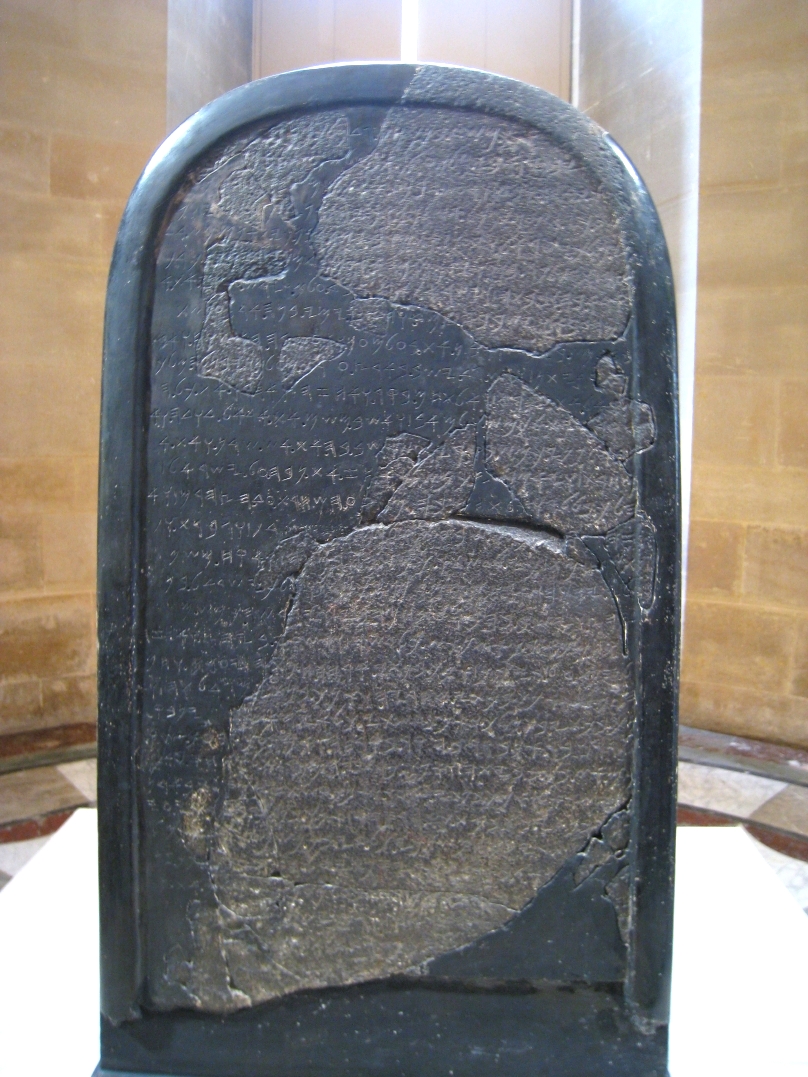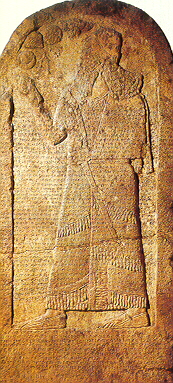|
House Of Jehu
The House of Jehu or Jehu dynasty was a reigning dynasty of the Kingdom of Israel. They are depicted in both of the Books of Kings. Their estimated reign is placed from the 9th century to the 8th century BCE.Chase (2010), p. 222-223 Reign The dynasty is named after its founder Jehu. His immediate predecessor was Jehoram of Israel of the House of Omri. Jehoram was wounded in battle during a campaign against the rival state of Aram-Damascus. Jehoram retreated to the city of Jezreel in order to recover from his wounds, but Jehu attacked and killed him there. Jehu also killed Jehoram's ally, Ahaziah of Judah. Jehu was reportedly anointed as king by the prophet Elijah (1 Kings 19:16). According to the Books of Chronicles, Jehu was authorized to eliminate the descendants of his predecessor Ahab and all the priests of the god Baal (2 Chronicles 22:7). Jehu continued the worship of the golden calves at the holy places of Bethel and Dan (2 Kings 10:28-31). The Book of Kings accuses Jehu ... [...More Info...] [...Related Items...] OR: [Wikipedia] [Google] [Baidu] |
Kingdom Of Israel (Samaria)
The Kingdom of Israel (), or the Kingdom of Samaria, was an Israelite kingdom in the Southern Levant during the Iron Age. The kingdom controlled the areas of Samaria, Galilee and parts of Transjordan. Its capital, for the most part, was Samaria (modern Sebastia). The Hebrew Bible depicts the Kingdom of Israel as one of two successor states to the former United Kingdom of Israel ruled by King David and his son Solomon, the other being the Kingdom of Judah; most historians and archaeologists, however, do not believe in the existence of a United Kingdom as depicted in the Bible.The debate is described in Amihai Mazar, "Archaeology and the Biblical Narrative: The Case of the United Monarchy" (see bibliography), p.29 fn.2: "For conservative approaches defining the United Monarchy as a state “from Dan to Beer Sheba” including “conquered kingdoms” (Ammon, Moab, Edom) and “spheres of influence” in Geshur and Hamath cf. e.g. Ahlström (1993), 455–542; Meyers (1998); Le ... [...More Info...] [...Related Items...] OR: [Wikipedia] [Google] [Baidu] |
Idolatry
Idolatry is the worship of a cult image or "idol" as though it were God. In Abrahamic religions (namely Judaism, Samaritanism, Christianity, the Baháʼí Faith, and Islam) idolatry connotes the worship of something or someone other than the Abrahamic god as if it were God. In these monotheistic religions, idolatry has been considered as the "worship of false gods" and is forbidden by texts such as the Ten Commandments. Other monotheistic religions may apply similar rules. For instance, the phrase ''false god'' is a derogatory term used in Abrahamic religions to indicate cult images or deities of non-Abrahamic Pagan religions, as well as other competing entities or objects to which particular importance is attributed. Conversely, followers of animistic and polytheistic religions may regard the gods of various monotheistic religions as "false gods" because they do not believe that any real deity possesses the properties ascribed by monotheists to their sole deity. Atheists, wh ... [...More Info...] [...Related Items...] OR: [Wikipedia] [Google] [Baidu] |
Omri
Omri ( ; he, , ''‘Omrī''; akk, 𒄷𒌝𒊑𒄿 ''Ḫûmrî'' 'ḫu-um-ri-i'' fl. 9th century BC) was, according to the Hebrew Bible, the sixth king of Israel. He was a successful military campaigner who extended the northern kingdom of Israel. Other monarchs from the House of Omri are Ahab, Ahaziah, Joram, and Athaliah. Like his predecessor, king Zimri, who ruled for only seven days, Omri is the second king mentioned in the Bible without a statement of his tribal origin. One possibility, though unproven, is that he was of the tribe of Issachar. Nothing is said in Scripture about the lineage of Omri. His name may be Amorite, Arabic, or Hebrew in origin.Thiel, W., "Omri", ''The Anchor Bible Dictionary'', p. 17, vol. 5, D.N. Freedman (ed.). New York: Doubleday (1992) Omri is credited with the construction of Samaria and establishing it as his capital. Although the Bible is silent about other actions taken during his reign, he is described as doing more evil than all the ... [...More Info...] [...Related Items...] OR: [Wikipedia] [Google] [Baidu] |
Neo-Assyrian Empire
The Neo-Assyrian Empire was the fourth and penultimate stage of ancient Assyrian history and the final and greatest phase of Assyria as an independent state. Beginning with the accession of Adad-nirari II in 911 BC, the Neo-Assyrian Empire grew to dominate the ancient Near East throughout much of the 8th and 7th centuries BC, becoming the largest empire in history up to that point. Because of its geopolitical dominance and ideology based in world domination, the Neo-Assyrian Empire is by many researchers regarded to have been the first world empire in history. At its height, the empire was the strongest military power in the world and ruled over all of Mesopotamia, the Levant and Egypt, as well as portions of Anatolia, Arabia and modern-day Iran and Armenia. The early Neo-Assyrian kings were chiefly concerned with restoring Assyrian control over much of northern Mesopotamia and Syria, since significant portions of the preceding Middle Assyrian Empire had been lost during a long ... [...More Info...] [...Related Items...] OR: [Wikipedia] [Google] [Baidu] |
Shalmaneser III
Shalmaneser III (''Šulmānu-ašarēdu'', "the god Shulmanu is pre-eminent") was king of the Neo-Assyrian Empire from the death of his father Ashurnasirpal II in 859 BC to his own death in 824 BC. His long reign was a constant series of campaigns against the eastern tribes, the Babylonians, the nations of Mesopotamia and Syria, as well as Kizzuwadna and Urartu. His armies penetrated to Lake Van and the Taurus Mountains; the Neo-Hittites of Carchemish were compelled to pay tribute, and the kingdoms of Hamath and Aram Damascus were subdued. It is in the annals of Shalmaneser III from the 850s BC that the Arabs and Chaldeans first appear in recorded history. Reign Campaigns Shalmaneser began a campaign against the Urartian Kingdom and reported that in 858 BC he destroyed the city of Sugunia and then in 853 BC also Araškun. Both cities are assumed to have been capitals of the Kingdom before Tushpa became a center for the Urartians. In 853 BC, a coalition was formed by 11 sta ... [...More Info...] [...Related Items...] OR: [Wikipedia] [Google] [Baidu] |
Shallum Of Israel
Shallum of Israel ( he, שַׁלּוּם ''Šallūm'', "retribution", ''fl.'' mid-8th century BC), was the fifteenth king of the ancient Kingdom of Israel, and the son of Jabesh. The Shallum dynasty, or the House of Shallum was an ephemeral dynasty, represented only by Shallum (reigned 752 BCE).Kaiser, Wegner (2017), Index In the Bible Originally a captain in the army of King Zechariah, Shallum "conspired against Zechariah, and smote him before the people; and slew him, and reigned in his stead" (). He reigned only "a month of days in Samaria" () before Menahem—another captain from Zechariah's army—rose up and put Shallum to death (). Menahem then became king in Shallum's stead. In the Books of Kings (2 Kings, Chapter 15, verses 10, 13-14) Shallum's father is identified as Jabesh. However, the passage may instead mention a toponym, identifying that Shallum was "the son" of a city called Jabesh.Freedman, Myers (2000), p. 664 In this view, Shallum may have originated from Ja ... [...More Info...] [...Related Items...] OR: [Wikipedia] [Google] [Baidu] |
Zechariah Of Israel
Zechariah ( he, זְכַרְיָה ''Zəḵaryāh'', meaning "remembered by Yah"; also ''Zachariah'', ''Zacharias''; la, Zacharias) was the fourteenth king of the northern Israelite Kingdom of Israel, and son of Jeroboam II. Zechariah became king of Israel in Samaria in the thirty-eighth year of Azariah, king of Judah. () William F. Albright has dated his reign to 746 BC – 745 BC, while E. R. Thiele offers the dates 753 BC – 752 BC.Edwin Thiele, ''The Mysterious Numbers of the Hebrew Kings'', (1st ed.; New York: Macmillan, 1951; 2d ed.; Grand Rapids: Eerdmans, 1965; 3rd ed.; Grand Rapids: Zondervan/Kregel, 1983). , 9780825438257 The account of his reign is briefly told in ''2 Kings'' (). According to the Bible, Zechariah did what was evil in the Lord's sight, as the previous kings of Israel since Jeroboam I had done. Zechariah ruled Israel for only six months before Shallum, a captain from his own army, murdered him and took the throne. This ended the dynasty o ... [...More Info...] [...Related Items...] OR: [Wikipedia] [Google] [Baidu] |
Arameans
The Arameans ( oar, 𐤀𐤓𐤌𐤉𐤀; arc, 𐡀𐡓𐡌𐡉𐡀; syc, ܐܪ̈ܡܝܐ, Ārāmāyē) were an ancient Semitic-speaking people in the Near East, first recorded in historical sources from the late 12th century BCE. The Aramean homeland was known as the land of Aram and encompassed central regions of modern Syria. At the beginning of the 1st millennium BCE, a number of Aramean states were established throughout the western regions of the ancient Near East. The most notable was the Kingdom of Aram-Damascus, which reached its height in the second half of the 9th century BCE during the reign of king Hazael. A distinctive Aramaic alphabet was developed and used to write the Old Aramaic language. During the 8th century BCE, local Aramean kingdoms were gradually conquered by the Neo-Assyrian Empire. The policy of population displacement and relocation that was applied throughout Assyrian domains also affected Arameans, many of whom were resettled by Assyrian authorit ... [...More Info...] [...Related Items...] OR: [Wikipedia] [Google] [Baidu] |
Jeroboam II
Jeroboam II ( he, יָרָבְעָם, ''Yāroḇə‘ām''; el, Ἱεροβοάμ; la, Hieroboam/Jeroboam) was the son and successor of Jehoash (alternatively spelled Joash) and the thirteenth king of the ancient Kingdom of Israel, over which he ruled for forty-one years in the eighth century BC. His reign was contemporary with those of Amaziah and Uzziah, kings of Judah. History William F. Albright has dated his reign to 786–746 BC, while E. R. Thiele says he was coregent with Jehoash 793 to 782 BC and sole ruler 782 to 753 BC. He was victorious over the Arameans, conquered Damascus, and extended Israel to its former limits, from "the entering of Hamath to the sea of the plain". In 1910, G. A. Reisner found sixty-three inscribed potsherds while excavating the royal palace at Samaria, which were later dated to the reign of Jeroboam II and mention regnal years extending from the ninth to the 17th of his reign. These ostraca, while unremarkable in themselves, contain valu ... [...More Info...] [...Related Items...] OR: [Wikipedia] [Google] [Baidu] |
Elisha
Elisha ( ; or "God is my salvation", Greek: , ''Elis îos'' or , ''Elisaié,'' Latin: ''Eliseus'') was, according to the Hebrew Bible, a prophet and a wonder-worker. His name is commonly transliterated into English as Elisha via Hebrew, Eliseus via Greek and Latin, or Alyasa via Arabic, and Elyasa or Elyesa via Turkish. Also mentioned in the New Testament and the Quran, Elisha is venerated as a prophet in Judaism, Christianity and Islam and writings of the Baháʼí Faith refer to him by name. Before he settled in Samaria, Elisha passed some time on Mount Carmel. He served from 892 until 832 BC as an advisor to the third through the eighth kings of Judah, holding the office of "prophet in Israel". He is called a patriot because of his help to soldiers and kings. In the biblical narrative, he is a disciple and protégé of Elijah, and after Elijah was taken up in a whirlwind, Elisha received a double portion of his power and he was accepted as the leader of the sons of th ... [...More Info...] [...Related Items...] OR: [Wikipedia] [Google] [Baidu] |
Jehoash Of Israel
Jehoash ( he, ''Yəhō’āš'' or ''Yō’āš''; Israelian Hebrew: *''’Āšīyāw''; Akkadian: 𒅀𒀪𒋢 ''Yaʾsu'' 'ia-'-su'' la, Joas; fl. c. 790 BC), whose name means "Yahweh has given,""Joash, Jehoash;" ''New Bible Dictionary''. Douglas, J.D., ed. 1982 (second edition). Tyndale House Publishers, Wheaton, IL, USA. , pp. 597–598 was the twelfth king of the ancient northern Kingdom of Israel (Samaria) and the son of Jehoahaz. He was the 12th king of Israel and reigned for 16 years. William F. Albright has dated his reign to 801–786 BC, while E. R. Thiele offers the dates 798–782 BC. When he ascended the throne, the Kingdom of Israel was suffering from the predations of the Arameans, whose king Hazael was conquering land controlled by Israel. Biblical account of his reign According to the second book of Kings, Jehoash was sinful and did evil in the eyes of Yahweh for tolerating the worship of the golden calves, yet outwardly at least he worshiped Yahweh ... [...More Info...] [...Related Items...] OR: [Wikipedia] [Google] [Baidu] |







